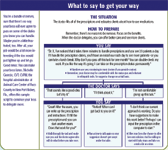Is the doctor stealing part of your job? Take it back!
Your veterinarian didn't go to school to learn to be a technician, receptionist, or practice manager, so don't let her act like one. Make her do her job--so you can do yours.
Sometimes just watching your boss work wears you out. One second she's drawing blood, the next she's in the lab looking at samples under the microscope. Blink again and she's changing a bandage or removing sutures.

Craig Woloshyn
If you work for one of these Wonder Women (or Supermen)—a doctor who begins the day answering phones and ends it mopping floors—you need to intervene. When the doctor tries to do everything it isn't just inefficient, it's downright boring for everyone else! Every time an interesting task crops up, she handles it before you can shout, "abscess incoming!"

Delegate Smarter
For your sanity and the health of the patients and the clinic, you need to take over the tasks your doctor performs that don't require a medical degree. The doctor's time is too valuable to spend on anything besides her essential duties—diagnosing, prescribing, performing surgery, and charting. And anyway, why should she have all of the fun?
Let's examine six tasks that are better suited to team members and look at ways to wrestle some of these responsibilities back from the doctor.
1. Primary patient care
A surprising amount of confusion exists about the difference between treatment plans and patient care. Treatment plans result from the thinking the doctor does after consulting her lab results and a crystal ball. Patient care is the delivery of treatment—placing catheters, giving injections, bandaging, offering pet hygiene, and so on. Ideally, a registered technician supervises this area and assistants assist her. (You thought veterinary assistants were doctors' assistants, didn't you. Nope. They're technicians' assistants.)
Too often doctors restrain patients, draw blood, place catheters, and remove sutures, instead of charting, examining patients, and performing research. From the time the client and patient walk through the door until they leave, team members are the ones who translate the doctor's orders into patient care. This leaves the doctor with more time to do her work—and maybe even grab a lunch.

What to say to get your way
2. Scheduling appointments
Scheduling should be a conspiracy between front- and back-office team members. Receptionists need the doctor's input initially to define the amount of time each procedure takes, but after that they can handle the scheduling just fine without a bunch of kibitzing. If receptionists have questions about scheduling an unusual procedure, they'll ask the technicians—they know everything.
What about the scheduling bumps that constantly crop up? No problem. You'll work with the rest of your team to set and adjust the schedule and maximize the doctor's time. Just don't let the doctor fiddle with the appointment book. Remind her that it's your job to fill the exam rooms and it's her job to enter these exam rooms and look intelligent.
3. Collecting samples and restraining patients
I find the number of injuries that occur in veterinary practices distressing, and many occur when we're restraining that cheeky Chihuahua or frenzied feline. That's why senior technicians must work closely with doctors to set protocols that address the realities of restraining both your friendliest and your most intensely violent patients.
First off, doctors need to grant technicians the authority to decide when to cease manual restraint. If necessary, technicians will administer tranquilizers on the doctor's orders. Here's the key: Once a staff member says a patient's too fractious to handle, the doctor can't override that decision. She may either administer the tranquilizer or decide not to perform the procedure, but she should never demand that team members put themselves at risk. If the doctor doesn't follow this rule, talk to her. Use data from the AVMA and your worker's compensation insurer to show the effect of injuries in the workplace.
Bottom line: Like many other routine tasks, once you establish protocols, it's hands off for the doctor. Technicians will train other team members and monitor their safety.
4. Lab operations
Doctors like toys that beep and cost a lot, and your lab is probably full of them. So it's no surprise that you'll often find the doctor hanging out in the lab like a fashion model at a Prada clearance sale. But there's not much for her to do there, so lock her out unless she's finished with all her other work. If your practice doesn't employ a registered technician, the doctor may need to perform some cytology or differentials, but otherwise she's about as useful in the lab as a raincoat on a sunny day.
Technicians and assistants: You should be trained to operate and care for all of the lab equipment, and since you already draw all the samples (don't you?) all you have to do is to deliver the results to the doctor. Lab sampling and testing is entirely a staff operation. If the doctor insists on visiting the lab, charge her admission. A piece of chocolate sounds about right.
5. Charging for services
Why should back-office team members create the invoices? For a couple of reasons:
- They know the procedures performed.
- They won't give things away.
- They know which doctor offered the care and can keep more accurate charges.
- They know when a patient can go home, and they can close the invoice.
Yes, the front office can handle charges, but they're usually busy and too far away from the medical trenches to catch mistakes and omissions. And doctors should never, ever, ever enter charges and invoices, lest they give away everything and wash the client's car, too. On average, clinics that allow doctors to enter charges give away 5 percent of their gross income every day. That's enough money for a pretty fancy office party!
6. Phone calls and callbacks
The phone is a critical piece of clinic equipment, but don't let your doctor answer a ringing line, even if you have to rip the receiver from her white-knuckled hands. Instead, use this simple triage system to handle all of your practice's incoming calls. The front office can answer clients' everyday questions, such as the clinic's hours or the cost of a spay. Technicians will handle the medical questions. If they can't field the queries, only then do you forward the calls to the doctor.
Once you've handled all of the incoming calls, dig out your address book and do a little dialing of your own. Callbacks are an important part of client education and a critical quality-control check on your medical procedures. You should have a simple, efficient system for callbacks, and you should do them every day. I recommend calling with progress reports for seriously ill pets and those that underwent surgery the day after the exam or procedure. Call clients with chronically ill pets according to your doctor's wishes.
When you take this efficient approach to calls, you'll cut the stack of messages that are breeding dust bunnies on the corner of the doctor's desk. She now has very few calls to make, so she can—gasp!—go home on time.
Making it happen
How do you make the change from a doctor-centric practice to a place where everyone does the jobs they're most capable of? Well, Binky, it ain't easy. Doctors often believe that they're the only ones who can do most tasks, but we know that's not true. For example, compared to registered technicians' abilities, most doctors' nursing skills are dismal. Getting the doctor to admit that may be harder than snatching a Godiva chocolate from her hand, but you've gotta try.
To get started, meet with the boss and outline the tasks you'd like to take over, more politely than I have here. Keep the list short for now—maybe two items. Once the doctor sees that you've mastered these tasks she'll learn to delegate more, and soon you'll be performing many of the jobs that she was doing just a short time ago.
Of course, these first steps are the hardest, so help the doctor out. Take the syringe from her trembling hand and replace it with a chart.
If the doctor still dabbles in your duties, try the chip game. Here's how it works: The doctor carries around a few poker chips. When you find her doing one of your tasks, complete the job yourself and demand a chip as payment. The staff member with the most chips at the end of the month gets a gift certificate for dinner.
Change is slow, but don't give up. By taking over these tasks, you'll make your clinic a more efficient, profitable, rewarding place to work. And you may snag some chocolate along the way.
Delegate smarter
On his Web site businessballs.com, Alan Chapman offers a simple delegation checklist. He says delegated tasks should be SMARTER:
- Specific
- Measurable
- Agreed upon
- Realistic
- Timebound
- Ethical
- Recorded
Craig Woloshyn, DVM, a Veterinary Economics Editorial Advisory Board member, owns Animal Medical Clinic in Spring Hill, Fla., and Sun Dog Veterinary Consulting. Send comments to: firstline@advanstar.com